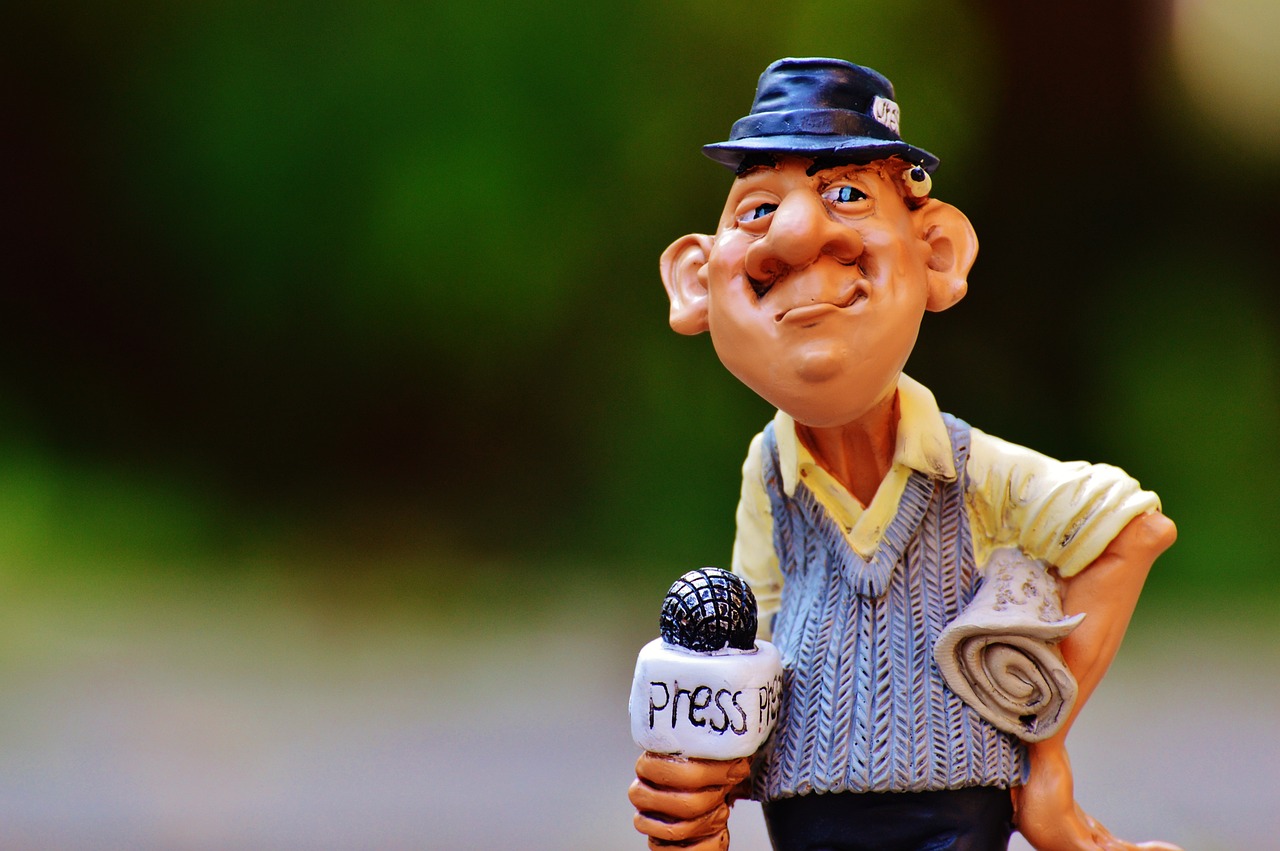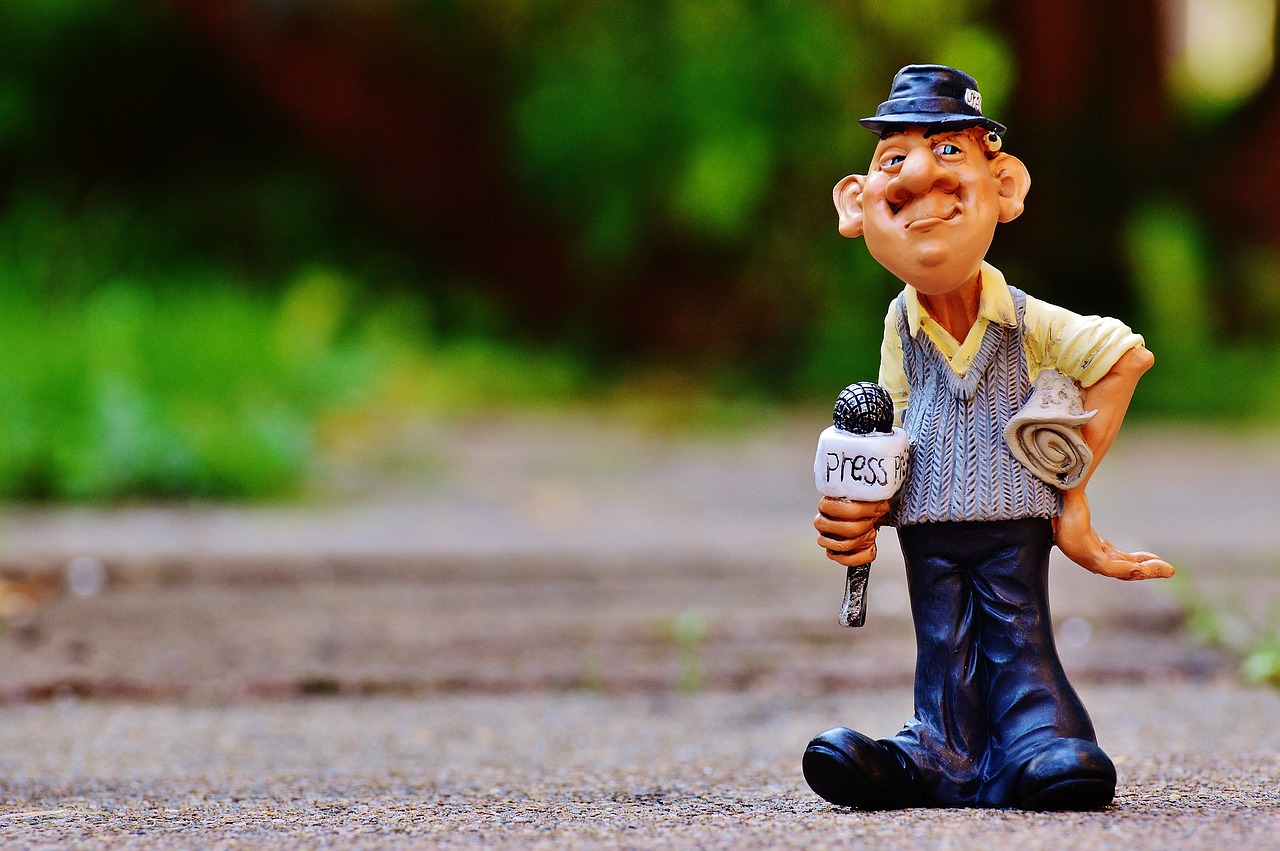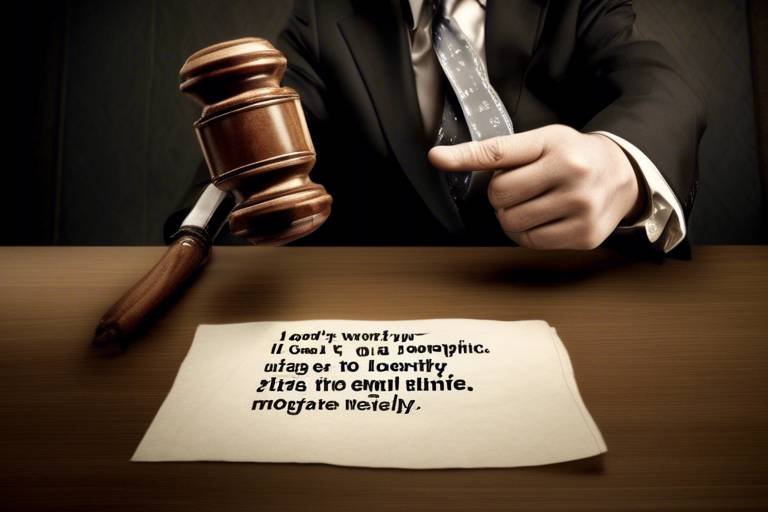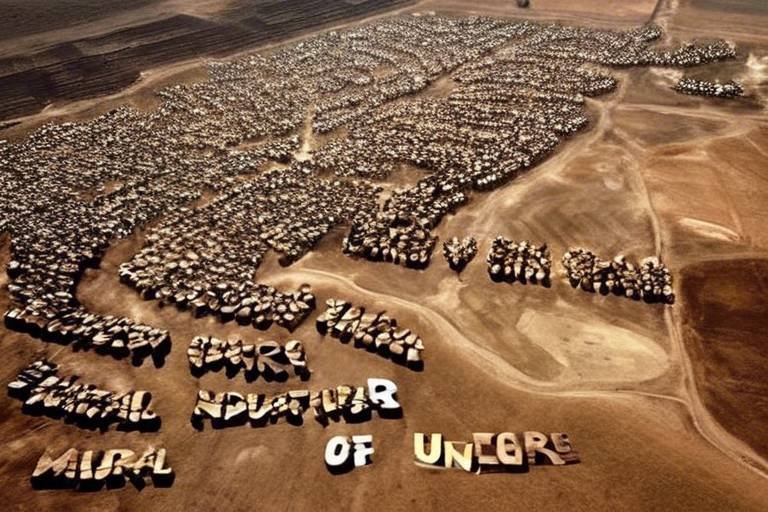Why Do Ethics Matter More Than Ever in Journalism?
In today’s fast-paced digital world, the relevance of ethics in journalism is more critical than ever. With the constant flow of information at our fingertips, the line between credible news and sensationalized gossip has blurred. This raises an important question: how can we, as consumers of information, distinguish between what is trustworthy and what is not? The answer lies in the ethical standards that guide journalists in their reporting. Ethics serve as the backbone of journalism, ensuring that the information disseminated to the public is not only accurate but also fair and responsible.
Imagine journalism as a bridge connecting the public to the truth. If that bridge is built on shaky ethical foundations, it risks collapsing under the weight of misinformation and public skepticism. This is why ethics in journalism are not just a set of guidelines; they are a lifeline that helps maintain the integrity of the media landscape. With the rise of digital platforms, the responsibility to uphold these ethical standards has intensified, making it essential for journalists to navigate the murky waters of modern reporting with care and precision.
Furthermore, the impact of ethical journalism extends beyond the newsroom. It plays a vital role in shaping public perception and trust. When journalists adhere to ethical principles, they foster a sense of accountability and transparency that resonates with their audience. This trust is essential for a functioning democracy, as it empowers citizens to make informed decisions based on reliable information. Without this trust, the very fabric of society can fray, leading to a disenchanted public and a dangerous proliferation of misinformation.
As we delve deeper into the complexities surrounding ethics in journalism, it becomes evident that these principles are not merely optional; they are essential. They guide journalists in their pursuit of truth and help them navigate the ethical dilemmas that arise in an increasingly complex media environment. In the following sections, we will explore the role of ethics in journalism, the impact of digital media, the challenges posed by misinformation, and the critical importance of accountability and public trust. Buckle up, because this journey into the ethical landscape of journalism is both enlightening and necessary!
Understanding the foundational role ethics play in journalism helps illuminate their significance in maintaining credibility and fostering trust between journalists and the communities they serve.
The rise of digital media has transformed journalism, presenting new ethical challenges that require careful navigation to uphold standards and protect the integrity of information.
Misinformation poses significant ethical dilemmas for journalists, necessitating a commitment to accuracy and fact-checking to combat the spread of false narratives.
Implementing effective strategies, such as rigorous fact-checking and transparency, is essential for journalists to counter misinformation and maintain public trust.
Social media platforms have become a double-edged sword, offering both opportunities for engagement and challenges related to the dissemination of misleading information.
Journalistic accountability is vital for ethical practice, ensuring that journalists are answerable for their reporting and fostering a culture of responsibility within the media.
The relationship between ethics and public trust is crucial; ethical journalism cultivates confidence in the media, which is essential for a functioning democracy.
Transparency in reporting practices is a key factor in building trust, allowing audiences to understand the processes behind news creation and dissemination.
Violations of ethical standards can lead to significant consequences, including loss of credibility, public backlash, and a detrimental impact on the journalism profession as a whole.
- What are the main ethical principles in journalism? The main ethical principles include accuracy, fairness, independence, and accountability.
- How does misinformation affect journalism? Misinformation undermines public trust and can lead to confusion and societal harm.
- Why is transparency important in journalism? Transparency builds trust with the audience, allowing them to understand how news is reported and verified.
- What are the consequences of unethical journalism? Unethical journalism can result in loss of credibility, legal repercussions, and damage to the profession's integrity.

The Role of Ethics in Journalism
In a world overflowing with information, the role of ethics in journalism has never been more critical. Ethics serve as the backbone of journalism, guiding reporters and editors in their quest to deliver accurate, fair, and balanced news. Without a solid ethical foundation, journalism can spiral into chaos, leading to sensationalism, misinformation, and a significant erosion of public trust. Think of ethics as the compass that helps journalists navigate through the murky waters of public opinion and media scrutiny.
At its core, journalism is about telling the truth. But what does "truth" mean in today’s complex media landscape? Ethics help define this truth, establishing standards that journalists must adhere to. These standards include principles such as accuracy, fairness, independence, and accountability. When journalists commit to these ethical principles, they not only uphold their profession but also foster a sense of trust with their audience. Trust is the currency of journalism; without it, the entire system collapses.
Moreover, ethics in journalism are not just about avoiding falsehoods or biased reporting; they also involve the responsibility to give a voice to the voiceless. This means that journalists must strive to represent diverse perspectives, ensuring that marginalized communities are included in the narrative. By doing so, they contribute to a more informed public and a healthier democracy. This ethical obligation is akin to a tightrope walk, where the balance between objectivity and advocacy must be maintained at all costs.
As we delve deeper into the complexities of ethical journalism, it’s essential to recognize that ethical dilemmas often arise in the field. Journalists may face situations where the truth conflicts with the potential harm it could cause. In such cases, ethical guidelines can help navigate these murky waters. For instance, when reporting on sensitive issues like crime or mental health, journalists must weigh the public's right to know against the potential harm to individuals involved. This balancing act is not just a professional challenge; it's a moral one.
In summary, the role of ethics in journalism is foundational. It shapes the way stories are told and influences the public's perception of the media. Journalists who prioritize ethical practices not only enhance their credibility but also contribute to a more informed society. As we continue to explore the impact of ethics on journalism, it’s clear that these principles are not merely guidelines; they are essential to the survival and integrity of the media landscape.

Impact of Digital Media on Ethical Standards
The rise of digital media has dramatically reshaped the landscape of journalism, bringing with it a myriad of ethical challenges that journalists must navigate. In this age of instant information and rapid dissemination, the stakes have never been higher. With just a click, news can spread across the globe, but so can misinformation. This duality presents a pressing question: how can journalists maintain ethical standards in such an unpredictable environment?
First and foremost, digital media has accelerated the pace at which news is reported. The demand for immediate updates can sometimes lead to a rush in publishing, which may compromise the accuracy of the information shared. Journalists are often under immense pressure to be the first to break a story, which can tempt them to skip crucial fact-checking processes. This urgency can create a slippery slope where ethical considerations are sidelined in favor of speed. In fact, a recent study indicated that over 60% of journalists admitted to feeling pressured to publish quickly, potentially jeopardizing their commitment to truth.
Moreover, the proliferation of social media platforms has introduced a new dimension to how news is consumed and shared. While these platforms can amplify important stories, they also facilitate the rapid spread of false narratives. For instance, a single tweet can reach millions within seconds, often without any verification of the facts. This has led to a situation where sensationalism can overshadow journalistic integrity. For example, during major events like elections or crises, misleading headlines can go viral, causing public panic or misinforming the electorate. To illustrate this, consider the following table that summarizes the impact of social media on news consumption:
| Aspect | Positive Impact | Negative Impact |
|---|---|---|
| Speed of Information | Immediate updates | Compromised accuracy |
| Audience Engagement | Interactive discussions | Spread of misinformation |
| Access to Diverse Perspectives | Broader viewpoints | Echo chambers |
In addition to these challenges, the digital age has also blurred the lines between professional journalism and citizen journalism. While anyone can report news via social media, the absence of rigorous ethical standards in citizen journalism raises concerns about the reliability of information. This democratization of news can be empowering, but it also complicates the role of traditional journalists who adhere to established ethical guidelines. How do journalists differentiate themselves in a sea of unverified information? The answer lies in a steadfast commitment to ethical practices that prioritize truth and accountability.
Furthermore, the algorithms that govern social media platforms can inadvertently prioritize sensational content over factual reporting. This creates an environment where ethical journalism struggles to gain visibility. Journalists must now compete not only with each other but also with viral content that may not adhere to any ethical standards. The challenge is to find innovative ways to engage audiences while upholding the values of journalism. By leveraging tools such as analytics and audience feedback, journalists can better understand what resonates with their audience while remaining committed to ethical reporting.
In conclusion, the impact of digital media on ethical standards in journalism is profound and multifaceted. As the landscape continues to evolve, journalists must adapt by embracing new technologies while remaining vigilant about their ethical responsibilities. It’s a delicate balance, but one that is essential for maintaining public trust and ensuring the integrity of the media. The road ahead may be fraught with challenges, but by prioritizing ethics, journalists can navigate this digital age with confidence and clarity.

Challenges of Misinformation
Misinformation is a pervasive issue in today's digital landscape, and it presents a multitude of challenges for journalists striving to uphold ethical standards. The rapid spread of information through social media and other online platforms has made it increasingly difficult to discern fact from fiction. As a result, journalists find themselves in a constant battle against false narratives that can quickly gain traction, often overshadowing accurate reporting. This scenario raises a critical question: how can journalists maintain their integrity while navigating this murky waters of misinformation?
One of the primary challenges is the **sheer volume of content** being generated every second. With the advent of user-generated content and the democratization of information sharing, anyone can publish anything at any time. This flood of information can lead to a dilution of quality, making it harder for audiences to identify credible sources. Journalists must be vigilant, as the lines between reliable news and sensationalism blur. They are tasked with not only reporting the news but also sifting through a minefield of misinformation to present the truth.
Moreover, the speed at which news travels today complicates the situation even further. In the race to break stories, there is often a temptation to prioritize speed over accuracy. This phenomenon can lead to the dissemination of unverified information, which can have severe repercussions. For instance, during a crisis, a single tweet or post can spark panic or confusion, underscoring the responsibility journalists have in ensuring their reports are accurate and well-founded.
To combat these challenges, journalists can adopt a series of strategies that emphasize the importance of accuracy and ethical reporting. Here are some essential approaches:
- Rigorous Fact-Checking: Journalists must commit to thorough fact-checking before publishing any information. This process not only enhances credibility but also helps to prevent the spread of falsehoods.
- Verification of Sources: Ensuring that information comes from credible and reliable sources is crucial. Journalists should verify the identity and expertise of their sources to bolster the integrity of their reporting.
- Transparency: Being transparent about the sources and methods used in reporting can help audiences understand the context and reliability of the information presented.
Ultimately, the challenges posed by misinformation require journalists to be more proactive than ever in their ethical commitments. By adopting stringent standards and prioritizing accuracy over speed, they can help restore public trust in the media. The fight against misinformation is not just about protecting the profession; it's about safeguarding the truth and ensuring that the public receives accurate, reliable information. In a world where misinformation can spread like wildfire, the role of ethical journalism has never been more critical.
- What is misinformation? Misinformation refers to false or misleading information that is spread, regardless of intent.
- How does misinformation affect journalism? It undermines public trust, complicates the reporting process, and can lead to the spread of panic or confusion.
- What can journalists do to combat misinformation? They can implement rigorous fact-checking, verify sources, and maintain transparency in their reporting practices.

Strategies to Combat Misinformation
In today’s fast-paced information age, combating misinformation is not just a responsibility; it’s a necessity for journalists who aim to uphold the integrity of their profession. The landscape of news has evolved dramatically, and with the rise of digital platforms, the spread of false information has become alarmingly easy. So, how can journalists effectively tackle this issue? Here are some key strategies that can help:
First and foremost, rigorous fact-checking is essential. Journalists must take the time to verify facts before publishing anything. This means cross-referencing sources, consulting experts, and using reliable databases. A solid fact-checking process not only enhances the credibility of the journalist but also serves as a safeguard against the dissemination of false narratives. For instance, many reputable news organizations have dedicated fact-checking teams that scrutinize claims made in public discourse. This practice not only enriches their reporting but also builds trust with their audience.
Another critical strategy is transparency. Journalists should openly share their sources and the methods used to gather information. By doing this, they allow readers to understand how news is constructed, fostering an environment of trust. When audiences see the effort put into gathering accurate information, they are more likely to believe and rely on the news being presented. This transparency can also involve acknowledging when information is uncertain or when the journalist is still gathering facts.
Moreover, media literacy education plays an important role in combating misinformation. Journalists can contribute to this by creating content that educates the public on how to discern credible news from fake news. This could include guides on identifying reliable sources, understanding the importance of cross-referencing information, and recognizing the signs of biased reporting. By empowering the audience with knowledge, journalists can help cultivate a more informed public that is less susceptible to misinformation.
Lastly, collaboration among journalists can be a powerful tool. By working together, news organizations can share resources, insights, and strategies to combat misinformation more effectively. For example, partnerships between different media outlets can lead to the creation of comprehensive fact-checking initiatives that cover a wider range of topics and reach larger audiences. By joining forces, journalists can amplify their efforts and create a more significant impact on the fight against misinformation.
In conclusion, while the challenge of misinformation is daunting, implementing these strategies can help journalists maintain their credibility and uphold the ethical standards of their profession. By prioritizing fact-checking, embracing transparency, promoting media literacy, and collaborating with peers, journalists can navigate the murky waters of misinformation and continue to serve the public with integrity.
- What is misinformation? Misinformation refers to false or misleading information that is spread, regardless of intent. This can include rumors, inaccurate reports, or misrepresented facts.
- How can I identify credible news sources? Look for established media outlets with a history of accuracy, check for author credentials, and verify information against multiple sources.
- Why is transparency important in journalism? Transparency builds trust between journalists and their audience, allowing readers to understand the processes behind news reporting and to evaluate the credibility of the information presented.
- What role does social media play in spreading misinformation? Social media can rapidly disseminate information, but it can also facilitate the spread of false narratives due to the lack of editorial oversight and fact-checking.

Role of Social Media
Social media has revolutionized the way we consume and share news, acting as both a powerful tool for engagement and a potential minefield for ethical dilemmas. On one hand, platforms like Twitter, Facebook, and Instagram allow journalists to reach wider audiences instantly, breaking news in real-time and fostering a sense of community among readers. Imagine a world where news travels faster than the speed of light; that’s the reality we live in today. However, this rapid dissemination of information comes with significant challenges.
One of the most pressing issues is the spread of misinformation. With anyone able to share content, the lines between credible journalism and sensationalist clickbait blur. It’s like a game of telephone; the original message can get distorted as it passes through countless users. This raises a crucial question: How can journalists ensure that their work remains trustworthy in a landscape flooded with unverified content?
To navigate this complex environment, journalists must embrace a proactive approach. Here are some key strategies they can adopt:
- Verification: Journalists need to double-check their sources, ensuring that the information they share is accurate. This can involve cross-referencing multiple sources or consulting experts in the field.
- Engagement: Social media offers a unique opportunity for journalists to engage with their audience directly. By responding to comments and questions, they can clarify misunderstandings and build rapport.
- Transparency: Being open about the challenges faced during the reporting process can help audiences appreciate the complexities of journalism and trust the final product more.
Furthermore, the role of algorithms in shaping the news we see cannot be overlooked. Social media platforms often prioritize content that garners the most engagement, which can lead to sensationalism overshadowing critical reporting. This creates a feedback loop where misleading information is amplified, while nuanced journalism struggles to gain traction. It’s a bit like a popularity contest, where the loudest voices often drown out the more thoughtful ones.
In this context, media literacy becomes crucial. Audiences must be equipped with the skills to discern credible information from misleading content. Journalists can play a significant role in this by providing educational resources and encouraging critical thinking among their followers. After all, a well-informed public is essential for a healthy democracy.
In summary, social media is a double-edged sword in the realm of journalism. While it offers unparalleled opportunities for connection and immediacy, it also presents significant ethical challenges that require careful navigation. Journalists must remain vigilant, adopting best practices to uphold their integrity and foster trust in an increasingly complex media landscape.
- What is the impact of social media on traditional journalism?
Social media has transformed traditional journalism by enabling faster news dissemination and broader audience engagement, but it also poses challenges like misinformation and ethical dilemmas. - How can journalists combat misinformation on social media?
Journalists can combat misinformation by verifying sources, engaging with audiences, and promoting transparency in their reporting practices. - Why is media literacy important in the age of social media?
Media literacy is crucial as it empowers audiences to critically evaluate information, helping them distinguish between credible news and misleading content.

Accountability in Journalism
Accountability in journalism is not just a buzzword; it’s a fundamental pillar that supports the entire structure of ethical reporting. Without accountability, the media risks becoming a chaotic free-for-all where sensationalism reigns supreme and truth takes a backseat. Think of journalism as a bridge connecting the public to the facts—they need to trust that the bridge is sturdy and well-maintained. When journalists are held accountable for their work, it ensures that they are not only reporting the facts but are also responsible for the impact those facts have on society.
In an age where information travels at lightning speed, journalists must recognize the weight of their words. The responsibility of reporting accurately and ethically is immense, and this is where accountability plays a crucial role. When journalists know they are answerable for their reporting, it encourages them to adhere to ethical standards and strive for excellence. This accountability can manifest in various forms, including:
- Self-regulation: Journalists should hold themselves to high standards, continuously reflecting on their work and its implications.
- Editorial oversight: Media organizations must have checks and balances in place to review and critique reporting before publication.
- Public feedback: Engaging with the audience and taking their concerns seriously can foster a sense of responsibility among journalists.
Moreover, accountability is not solely about the individual journalist; it extends to the organizations they represent. Media outlets must be transparent about their practices and willing to address any missteps openly. This transparency can be achieved through regular audits, public disclosures, and an open-door policy for audience feedback. When news organizations prioritize accountability, they not only enhance their credibility but also contribute to a healthier media ecosystem.
In conclusion, accountability in journalism is essential for maintaining ethical standards and fostering trust between the media and the public. It is a continuous process that requires commitment from both journalists and their organizations. By embracing accountability, the journalism profession can better serve society, ensuring that the information disseminated is not only accurate but also responsible.
- What is accountability in journalism? Accountability in journalism refers to the responsibility that journalists and media organizations have to report accurately and ethically, being answerable for their work.
- Why is accountability important? Accountability is crucial because it helps maintain public trust, ensures ethical reporting, and encourages journalists to adhere to high standards.
- How can journalists ensure accountability? Journalists can ensure accountability through self-regulation, editorial oversight, and engaging with audience feedback.

Public Trust and Journalism
In today's fast-paced world, the relationship between ethics and public trust in journalism has never been more crucial. As news consumption habits evolve, audiences are increasingly discerning about the content they engage with. They crave transparency, accuracy, and integrity. When journalists adhere to ethical standards, they not only uphold their profession's credibility but also foster a sense of confidence among the public. But why does this matter? Well, think of journalism as the backbone of democracy; without trust, that backbone weakens, leading to a society where misinformation can thrive.
One of the key components of building trust is the commitment to ethical reporting. Journalists must prioritize truthfulness and objectivity, ensuring that their reporting reflects a balanced view. When audiences perceive that journalists are committed to these values, they are more likely to trust the information being presented. This trust is essential, especially when considering the significant role that journalism plays in shaping public opinion and influencing policy decisions.
Moreover, the impact of ethical journalism extends beyond individual stories; it contributes to the overall health of the media landscape. When news organizations prioritize ethics, they set a standard for the industry. This creates a ripple effect, encouraging other outlets to follow suit. In contrast, when ethical breaches occur, the consequences can be severe. A single instance of unethical reporting can lead to widespread skepticism about the media, undermining the public's trust not only in the offending outlet but in journalism as a whole.
To illustrate the importance of public trust in journalism, consider the following table that highlights the consequences of ethical breaches:
| Consequence | Description |
|---|---|
| Loss of Credibility | Once trust is broken, it can be incredibly difficult for journalists or news organizations to regain credibility. |
| Public Backlash | Unethical practices can lead to public outrage, resulting in protests or calls for accountability. |
| Impact on Democracy | A decline in public trust can lead to disengagement from civic duties, ultimately harming democratic processes. |
In conclusion, the connection between ethics and public trust in journalism is a delicate yet vital one. As journalists navigate the complex landscape of news reporting, they must remain steadfast in their commitment to ethical practices. By doing so, they not only enhance their own credibility but also contribute to a more informed and engaged society. After all, in a world inundated with information, trust is the currency that keeps the public engaged and the democracy thriving.
- Why is public trust important in journalism? Public trust is essential because it ensures that audiences believe in the information being presented, which is critical for a functioning democracy.
- What are the consequences of ethical breaches? Ethical breaches can lead to loss of credibility, public backlash, and a detrimental impact on the journalism profession.
- How can journalists build trust with their audience? By committing to transparency, accuracy, and ethical reporting practices, journalists can foster trust with their audience.

Building Trust Through Transparency
In the ever-evolving landscape of journalism, transparency stands as a cornerstone for building trust between journalists and their audiences. When news organizations openly share their processes, methodologies, and the challenges they face, it cultivates a sense of authenticity that resonates deeply with readers. Imagine walking into a restaurant where the chef not only prepares your meal but also invites you into the kitchen to see how it’s done. That’s the kind of openness that journalism needs today.
Transparency is not just about revealing the facts; it’s about creating a narrative that audiences can connect with. For instance, when journalists disclose their sources or explain the reasoning behind their editorial choices, they allow the public to see the story from a different angle. This practice not only enhances credibility but also empowers readers to engage critically with the news. After all, wouldn’t you prefer to know the story behind the story?
Furthermore, transparency can take many forms in journalism, such as:
- Open Reporting: Journalists should share how they gather information, including the challenges they face in obtaining it.
- Source Attribution: Clearly attributing sources helps audiences understand where information originates, fostering trust in the content.
- Corrective Measures: When errors occur, promptly acknowledging and correcting them publicly reinforces a commitment to accuracy.
To illustrate the impact of transparency, let’s consider a recent case where a major news outlet faced backlash for a misleading report. Instead of doubling down, they released a detailed statement explaining their editorial process and the steps they took to verify their information. This move not only quelled the criticism but also restored some level of trust among their audience. It’s a powerful reminder that even in the face of adversity, transparency can act as a bridge to rebuild relationships.
Moreover, in today’s digital age, where information spreads like wildfire, the demand for transparency is more crucial than ever. Audiences are increasingly skeptical and often turn to alternative sources for news. By prioritizing transparency, journalists can differentiate themselves from the noise and position themselves as reliable sources of information. This differentiation is vital for survival in a crowded media landscape.
In conclusion, building trust through transparency is not merely a good practice; it is an essential strategy for the future of journalism. As the media continues to navigate the complexities of modern reporting, embracing transparency will not only enhance credibility but also fortify the essential bond between journalists and the public they serve. So, let’s ask ourselves: Are we ready to pull back the curtain and invite our audience into the world of journalism?
- What is transparency in journalism? Transparency in journalism refers to the practice of openly sharing the processes, methodologies, and challenges involved in news reporting.
- Why is transparency important? Transparency builds trust between journalists and their audience, enhances credibility, and allows for a more informed public.
- How can journalists ensure transparency? Journalists can ensure transparency by openly disclosing sources, explaining their reporting processes, and promptly correcting errors.
- What are the consequences of a lack of transparency? A lack of transparency can lead to public distrust, loss of credibility, and a negative impact on the journalism profession as a whole.

The Consequences of Ethical Breaches
When we talk about journalism, we often think of it as a noble profession, a beacon of truth shining through the fog of misinformation. However, when ethical standards are breached, the consequences can be severe, not just for the individual journalist, but for the entire media landscape. Imagine a ship navigating through treacherous waters; one wrong turn can lead to disaster. In journalism, ethical breaches can capsize public trust, leading to a ripple effect that impacts the entire community.
One of the most immediate consequences of unethical journalism is the loss of credibility. Once a journalist or a news organization is caught in a scandal—be it plagiarism, fabrication of sources, or misrepresentation of facts—their reputation can suffer irreparable damage. Just like a cracked glass, no matter how well you try to piece it back together, the cracks will always be visible. This loss of credibility can take years, if not decades, to rebuild, if it can be rebuilt at all.
Furthermore, ethical breaches can lead to public backlash. Audiences today are more discerning than ever; they have access to a vast array of information and can quickly spot inconsistencies. When a journalist fails to uphold ethical standards, the public doesn't just shrug it off. They respond with outrage, often taking to social media to voice their discontent. This can create a toxic environment where trust is eroded, and the media is viewed with suspicion. The consequences of this backlash can be catastrophic, leading to decreased viewership, loss of advertising revenue, and even layoffs within news organizations.
Additionally, ethical breaches can have legal ramifications. In an age where lawsuits are increasingly common, journalists who misrepresent facts or violate privacy rights may find themselves facing legal actions. This not only puts the journalist in a precarious position but can also tarnish the reputation of the media outlet they represent. Legal battles can drain resources and divert attention from the core mission of journalism—reporting the truth.
Moreover, the impact of ethical breaches extends beyond individual journalists or news organizations; it can also affect the journalism profession as a whole. When ethical standards are compromised, it creates a culture of skepticism towards all media. This can lead to a broader societal issue where people become disengaged from news altogether, viewing it as nothing more than sensationalism or propaganda. As a result, the important role of journalism in fostering informed citizens is jeopardized.
To illustrate the potential fallout from ethical breaches, consider the following table:
| Consequence | Description |
|---|---|
| Loss of Credibility | Once trust is broken, it can take years to rebuild. |
| Public Backlash | Outrage can lead to decreased viewership and revenue. |
| Legal Ramifications | Misrepresentation can result in lawsuits and financial loss. |
| Cultural Impact | Widespread skepticism can lead to disengagement from news. |
In conclusion, the consequences of ethical breaches in journalism are far-reaching and multifaceted. From the immediate fallout of lost credibility to the broader cultural impact on public trust, the stakes are incredibly high. As journalists, it is crucial to remember that with the power to inform comes the responsibility to uphold ethical standards. After all, in the world of journalism, integrity is not just a buzzword; it is the foundation upon which trust is built.
- What are some common ethical breaches in journalism? Common ethical breaches include plagiarism, fabrication of sources, and misrepresentation of facts.
- How can journalists rebuild trust after an ethical breach? Rebuilding trust requires transparency, accountability, and a commitment to ethical reporting practices.
- Why is public trust important in journalism? Public trust is essential for a functioning democracy as it ensures that citizens are informed and engaged.
- What role does social media play in journalism ethics? Social media can amplify both ethical breaches and accountability, making it a double-edged sword for journalists.
Frequently Asked Questions
- Why are ethics crucial in journalism?
Ethics are the backbone of journalism, ensuring that reporters maintain credibility and foster trust with their audience. In today's world, where misinformation is rampant, ethical standards help journalists navigate complex situations and provide accurate information.
- How has digital media affected journalistic ethics?
The rise of digital media has brought about new challenges, such as the rapid spread of misinformation and the pressure to publish content quickly. Journalists must now balance the need for speed with the commitment to accuracy and ethical reporting.
- What are the main challenges of misinformation?
Misinformation presents significant ethical dilemmas, as it can lead to public confusion and distrust. Journalists need to prioritize fact-checking and accuracy to combat false narratives and uphold their responsibility to inform the public.
- What strategies can journalists use to combat misinformation?
Effective strategies include rigorous fact-checking, transparency in reporting practices, and engaging with audiences to clarify information. These approaches help build trust and ensure that the public receives accurate news.
- What role does social media play in journalism ethics?
Social media serves as both a valuable tool for engagement and a source of ethical challenges. While it allows journalists to reach wider audiences, it also facilitates the spread of misleading information, making ethical considerations essential.
- Why is accountability important in journalism?
Accountability in journalism is vital for maintaining ethical practices. It ensures that journalists are answerable for their reporting, fostering a culture of responsibility that enhances public trust in the media.
- How does ethical journalism build public trust?
Ethical journalism cultivates confidence in the media by prioritizing accuracy, fairness, and transparency. When audiences understand the processes behind news creation, they are more likely to trust the information being presented.
- What are the consequences of ethical breaches in journalism?
Violations of ethical standards can lead to severe consequences, including loss of credibility, public backlash, and damage to the journalism profession as a whole. Such breaches can undermine the trust that is essential for a functioning democracy.



















